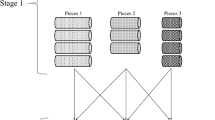Abstract
This paper describes a real problem in a market-driven medium sized foundry delivering a wide range of castings to different markets. The problem consists of finding an efficient production plan to schedule the different processes (moulding, furnacing, cutting, tooling, etc.) needed to the manufacture of the pieces. Different objectives and resources and technical constraints must be taken into account. To solve this problem we have first developed a more classical integer linear programming approach based on a rolling horizon strategy. The most innovative contribution of the paper is that it models the problem as a project scheduling problem. Based on this model we present a metaheuristic algorithm that adapts techniques from the area. Computational experiments comparing both approaches are provided on instances created by a generator simulating real instances.
Similar content being viewed by others
References
Araujo SA, Arenales MN, Clark AR (2008) Lot sizing and furnace scheduling in small foundries. Comput Oper Res 35:916–932
Ballestín F, Valls V, Quintanilla M (2008) Preemption in resource-constrained project scheduling. Eur J Oper Res 189:1136–1152
Ballestín F (2007) When it is worthwhile to work with the stochastic RCPSP? J Sched 10(3):153–166
Blazewicz J, Lenstra JK, Rinooy Kan AHG (1983) Scheduling subject to resource constraints: Classification and complexity. Discrete Appl Math 5:11–24
Demeulemeester E, Herroelen W (2002) Project scheduling—a research handbook. Kluwer Academic, Boston
Drexl A (1991) Scheduling of project networks by job assignment. Manag Sci 37:1590–1602
Du J, Leung JYT (1990) Minimizing total tardiness on one machine is NP-hard. Math Oper Res 15(3):483–485
Garey MR, Johnson DS, Sethi R (1976) The complexity of flowshop and jobshop scheduling. Math Oper Res 1:117–129
Goldberg DE (1989) Genetic algorithms in search, optimization, and machine learning. Addison-Wesley, Reading
Gravel M, Price WL, Cagné C (2002) Scheduling continuous casting of aluminium using a multiple objective ant colony optimization metaheuristic. Eur J Oper Res 143:218–229
Hartmann S (1998) A competitive genetic algorithm for resource-constrained project scheduling. Nav Res Logist 45:733–750
Hartmann S (2001) Project scheduling with multiple modes: a genetic algorithm. Ann Oper Res 102:111–135
Holland HJ (1975) Adaptation in natural and artificial systems. University of Michigan Press, Ann Arbor
Kolisch R (1995) Project scheduling under resource constraints—efficient heuristics for several problem classes. Phisica, Heidelberg
Kolisch R, Hartmann S (2006) Experimental investigation of heuristics for resource-constrained project scheduling: an update. Eur J Oper Res 174(1):23–37
Kolisch R, Padman R (2001) An integrated survey of deterministic project scheduling. Omega 29:249–272
Maes J, McClain JO, Van Wassenhove LN (1991) Multilevel capacitated lotsizing complexity and LP based heuristic. Eur J Oper Res 53:131–148
Méndez CA et al. (2006) State-of-the-art review of optimization methods for short-term scheduling of batch processes. Comput Chem Eng 30(6–7):913–946
Neumann K, Schwindt C (2002) Exact and truncated branch-and-bound procedures for resource-constrained project scheduling with discounted cash flows and general temporal constraints. Cent Eur J Oper Res 10:357–380
Neumann K, Schwindt C, Zimmermann J (2003) Project scheduling with time windows and scarce resources. Springer, Berlin
Nonas SL, Olsen KA (2005) Optimal and heuristic solutions for a scheduling problem arising in a foundry. Comput Oper Res 32:2351–2382
Pinedo M (2008) Scheduling: theory, algorithms, and systems. Prentice Hall, New York
Pritsker AAB, Watters LJ, Wolfe PM (1969) Multi project scheduling with limited resources: a zero-one programming approach. Manag Sci 16:93–108
Santos-Meza E, Oliveira M, Nereu M (2002) A lot-sizing problem in an automated foundry. Eur J Oper Res 139:490–500
Schwindt C, Trautmann N (2003) Scheduling the production of rolling ingots: industrial context, model and solution method. Int Trans Oper Res 10:547–563
Slowinski R, Soniewicki B, Weglarz J (1994) DSS for multiobjective project scheduling. Eur J Oper Res 79(2):220–229
Sule DR (2008) Production planning and industrial scheduling, 2nd edn. CRC Press/Taylor & Francis, Boca Raton. ISBN 978-1-4200-4420-1
Tang L, Liu G (2007) A mathematical programming model and solution for scheduling production orders in Shangai Baoshan Iron and Steel Complex. Eur J Oper Res 182:1453–1468
Tang L, Liu J, Rong A, Yang Z (2001) A review of planning and scheduling systems and methods for integrated steel production. Eur J Oper Res 133:1–20
Tseng C, Liao C (2008) A particle swarm optimization algorithm for hybrid flow-shop scheduling with multiprocessor tasks. Int J Prod Res 46(17):4655–4670
Valls V, Ballestín F, Quintanilla S (2005) Justification and RCPSP: A technique that pays. Eur J Oper Res 165:375–386
Author information
Authors and Affiliations
Corresponding author
Rights and permissions
About this article
Cite this article
Ballestín, F., Mallor, F. & Mateo, P.M. Production scheduling in a market-driven foundry: a mathematical programming approach versus a project scheduling metaheuristic algorithm. Optim Eng 13, 663–687 (2012). https://doi.org/10.1007/s11081-011-9157-z
Received:
Accepted:
Published:
Issue Date:
DOI: https://doi.org/10.1007/s11081-011-9157-z




